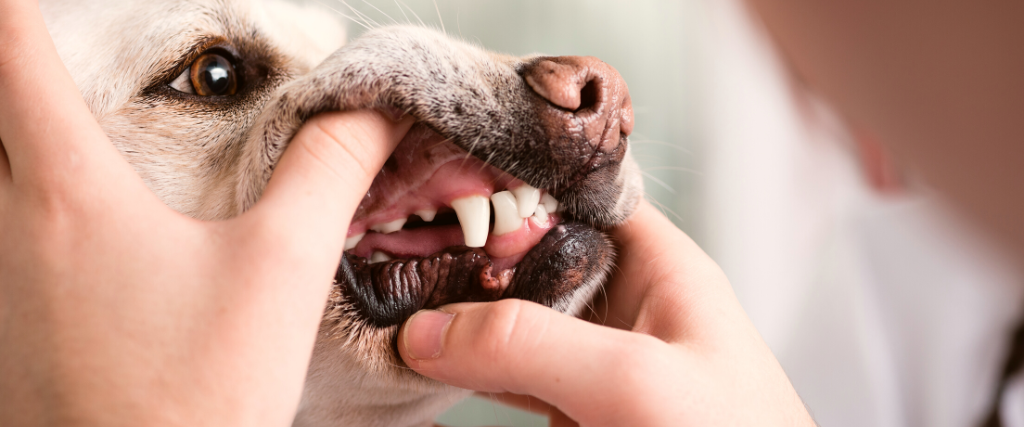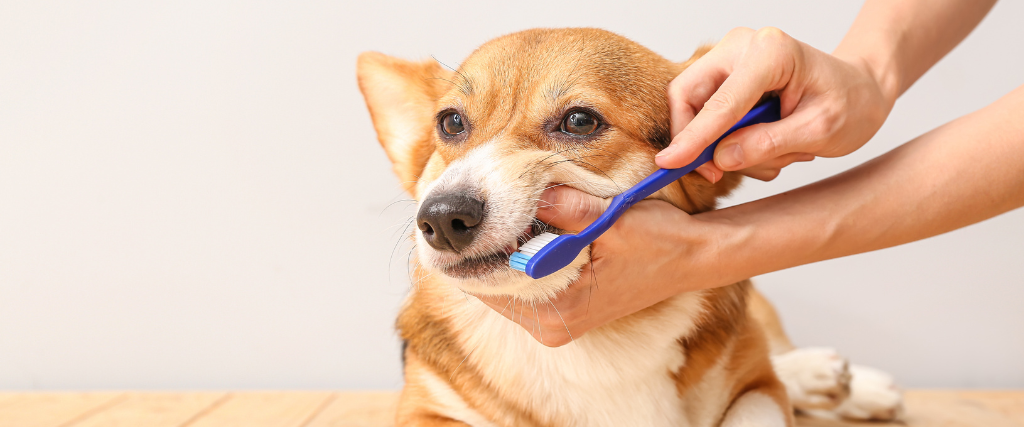As a pet parent, you naturally want to do everything you can to help your dog live a healthy, happy life — and that includes keeping their teeth and gums in good shape. Dental care for dogs ranges from routine exams and scale and polish procedures to tooth extractions and more complex treatments, all of which are performed under general anaesthesia. This is because even routine dog teeth cleanings can be uncomfortable — and in some cases unsafe — to perform on a dog that is awake or unsettled.
Once your dog has had a dental procedure, it’s important to follow our post-operative instructions carefully. This not only ensures a smooth and comfortable recovery, but also helps to prevent complications. Ongoing home dental care is also essential in maintaining oral health and reducing the risk of future dental disease. As your dog’s veterinary team, we’ve compiled our top tips for post-op and home care to help you keep your dog’s teeth healthy for the long term.
Why Post-Operative Dental Care Is Important for Dogs
Proper post-operative dental care is essential for preventing pain and avoiding infections. After your dog’s dental procedure, we’ll provide detailed aftercare instructions specific to your pet’s treatment, and we’ll explain anything you need to do in the days following their procedure.
If your dog has only had a routine scale and polish, aftercare is usually minimal. However, if they’ve had one or more teeth extracted or undergone oral surgery, there may be more involved care required.
By following our post-op instructions, you can help ensure a smoother recovery and avoid setbacks or complications. And of course, if you have any questions or concerns at any point, don’t hesitate to contact us — we’re here to help.
Don’t Brush Your Dog’s Teeth or Give Dental Treats During the First Week
It’s important to keep your pet’s mouth clean during recovery — but if your dog has had oral surgery or extractions, brushing or chewing can interfere with the healing process. To protect their gums and reduce the risk of infection or irritation, please avoid brushing your dog’s teeth or offering any dental treats for at least one week after the procedure.
Letting the gums rest will help them heal faster. After the first week, you can gradually resume your dog’s regular dental care routine, starting gently and only when your dog is comfortable.

Provide Soft Food After Major Dental Procedures
Following any significant dental work — especially extractions or oral surgery — your dog will need to eat soft food for several days. You can use canned dog food, or prepare a bland mix such as cooked chicken and white rice. Alternatively, you can soften your dog’s regular kibble by soaking it in warm water for 10–15 minutes before serving. In some cases, we may recommend a prescription diet to aid digestion or recovery.
Soft food helps prevent pain while chewing, and also protects healing areas in the mouth, including sutures. If your dog is prescribed antibiotics or pain relief medication, soft food can also make it easier to administer and absorb.
How to Brush Your Dog’s Teeth at Home
Brushing your dog’s teeth at home is one of the best ways to prevent dental disease. It might seem intimidating at first, but with a bit of patience (and some tasty toothpaste), it can become a simple daily habit.
Use a toothbrush designed for dogs and a pet-safe toothpaste — never use human toothpaste, as some ingredients are toxic to dogs. Enzymatic canine toothpaste, often available in flavours like chicken or beef, is a good choice.
Start slowly. Let your dog sniff the toothbrush and taste the toothpaste. Once they’re comfortable, gently brush the outer surfaces of their teeth, especially the back molars, where plaque tends to build up. Go at your dog’s pace and stop if they become too stressed. You may not reach all their teeth at first — that’s okay. The key is consistency. With daily practice and positive reinforcement (lots of praise and treats!), it’ll soon become part of your routine.

Offer Vet-Approved Dental Toys and Treats
In addition to brushing and regular professional cleanings, providing vet-approved dental chews and toys can help reduce plaque and support your dog’s oral health. These products are not a replacement for brushing, but they can be a useful addition to your dog’s dental care routine.
When choosing dental treats, look for products that have been tested and approved by recognised organisations such as the Veterinary Oral Health Council (VOHC). These products have been shown to help reduce plaque or tartar accumulation.
Some VOHC-accepted products commonly available in Australia include:
- Greenies® Dental Treats for Dogs
- Purina DentaLife® Daily Oral Care Chews
- Hill’s Science Diet Oral Care
- Pedigree® Dentastix™ Advanced
- Milk-Bone Brushing Chews
(Availability may vary depending on your local stockist — feel free to ask us for product recommendations suited to your dog.)
Care for Your Dog’s Teeth With Purpose
By following these post-operative and at-home dental care tips, you’ll help your dog recover comfortably from their procedure and reduce the risk of future dental problems. Good dental hygiene supports overall health and well-being — and it helps keep your dog smiling for years to come.
If your dog has recently had dental treatment and you have questions about their recovery, or if they’re due for a dental health check, please don’t hesitate to reach out. You can call us directly at (808) 460-3939, or you can email us at [email protected]. Don't forget to follow us on social media Facebook, Instagram.
